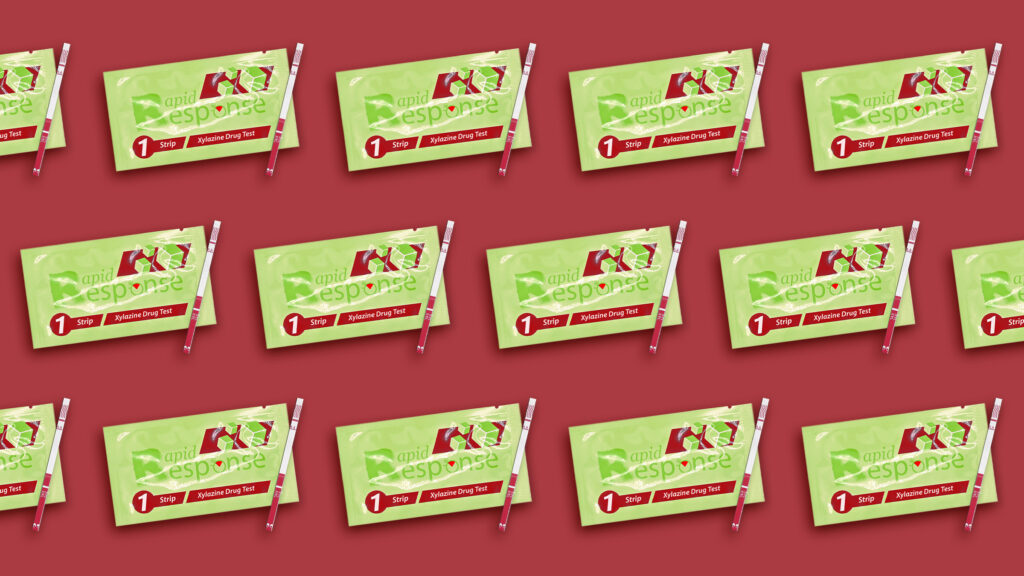Public health workers will soon have a new tool at their disposal to thwart a spreading danger to users of illicit drugs: xylazine test strips.
The new testing kits will allow health departments, grassroots harm-reduction groups, and individual drug users to test substances for the presence of xylazine, a sedative often referred to as “tranq.”
The toxin is increasingly common in the U.S. illicit-drug supply — especially in the Philadelphia area, but increasingly in other cities, too. Xylazine, which is typically used as a sedative in veterinary settings, can cause people to stop breathing, and also often causes severe skin wounds when injected.
“It’s the exact same concept as fentanyl test strips,” said Alex Krotulski, a forensic toxicologist at the Center for Forensic Science Research & Education, a Philadelphia-area research lab and outreach center that published a recent study of the strips’ effectiveness. “Their utility is really going to be among people who are using opioids who want to know if their opioids are adulterated.”
The new test strips represent the latest technological innovation in the field of harm reduction, a public health philosophy aimed at helping people who use drugs avoid the worst consequences of substance use, like disease transmission, overdose, and death. The fact that xylazine test strips are necessary in the first place underscores the ever-worsening state of the U.S. illegal drug supply.
Fentanyl, an ultra-potent synthetic opioid, has dominated the country’s illicit opioid market for years. Xylazine, similarly, is now present in roughly 90% of illicit opioid samples in Philadelphia, heightening the risk of overdose and prompting a scramble among local public health officials and harm-reduction groups to offer wound care for those who suffer painful and dangerous skin lesions.
Xylazine is spreading quickly: Anne Milgram, the administrator of the Drug Enforcement Administration, recently warned that in 2022, the agency’s labs found xylazine in 7% of fentanyl pills and 23% of fentanyl powder seized by law enforcement.
The Food and Drug Administration is also sounding the alarm on xylazine, moving last month to crack down on imports of the ingredients used to manufacture it. Additionally, the agency has warned that the drug does not respond to naloxone, the medication used to reverse opioid overdoses.
The new test strips will be distributed by BTNX, a Canada-based company that also manufactures a popular brand of fentanyl test strips.
In an email to STAT, BTNX confirmed the strips’ availability and said they would be priced at $200 per box of 100, which is substantially more than the price of fentanyl test strips. Some strips are already available for purchase, wrote Molly McKay, a BTNX marketing manager, with more in production.
“Using the same model we currently employ for our fentanyl strips, we are capable of producing, warehousing, and shipping the Rapid Response Xylazine Test Strip to match the demand of the market,” she wrote.
Validation testing performed by CFSRE, the Philadelphia-area laboratory, in partnership with the Philadelphia Department of Public Health, showed the strips to be highly sensitive. The test strips consistently detected the compound within drug samples that contained a wide range of xylazine concentrations, Krotulski said.
Importantly, he added, the lab’s tests did not record any false negative results: instances in which a drug sample contained xylazine but the test strip failed to detect it. The one hiccup, Krotulski said, was that the test strips came up positive for samples that did not contain xylazine but did contain lidocaine, a medication used as a local anesthetic or, sometimes, to treat irregular heartbeats.
“Every test strip is going to have some sort of limitation when it comes to cross-reactivity,” Krotulski said. “Overall, the strips were effective in the protocol that we used, and for the purposes of doing drug-checking work with these strips in the Philadelphia population.”
The strips are largely identical to existing strips used to test substances for the presence of fentanyl. But with the U.S. drug supply growing more toxic, fentanyl test strips have lost much of their usefulness. While fentanyl tests can still help protect people using cocaine or other substances, for many Americans who use opioids, the question isn’t whether their drugs contain fentanyl — it’s how much.
Fentanyl test strips have also proven controversial, and in many states are classified as illegal thanks to decades-old drug paraphernalia laws.
It remains unclear whether xylazine test strips will experience similar resistance, especially given growing acceptance of fentanyl test strips. Though most states have passed bills to update their drug-paraphernalia laws, such legislation has been narrowly tailored to fentanyl.
A recently passed law in California and a proposal gaining traction in Texas, for instance, both contain language specific to fentanyl — meaning that xylazine test strips would not be covered.


